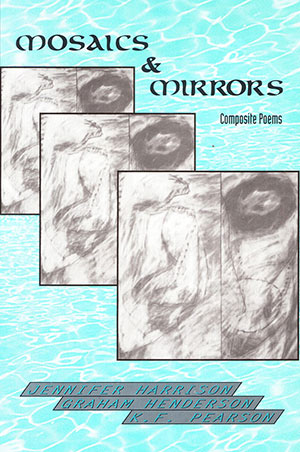 |
Mosaics & Mirrors; Composite Poems Jennifer Harrison, Graham Henderson & K.F. Pearson |
|||||||
Book Description Three discretely distinguished poets Jennifer Harrison, Graham Henderson and K.F. Pearson have conjointly composed a collection of fearless intense works. There is nothing satirical here. Their composite sensibility rejoices in our contemporary, if troubled, world. Their poems engage the emotions, confront our alienation and celebrate friendship and love. They defy the post-Romantic idea of the individual author. Acutely alive to tradition, they re-make it in clothes that tradition in a mirror would hardly know. They terrify, delight and intrigue. Mosaics & Mirrors is a tribute to the collective imagination. ISBN 0646240471 Published 1996 56 pgs $19.95 |
||||||||
Book Sample
Poetry by Consenting Adults Mosaics & Mirrors; Composite Poems Michael Costigan Australian Book Review, No. 183, August 1996 "Is
it
possible, I asked myself, that this is an Angry Penguins episode in
reverse, that a sole poet actually wrote all the poems, presenting them
as the work of three in order to deride the attempts of critics to
identify each one’s contribution?"
Is the writing of good poetry necessarily a solitary act? Or can it also be achieved co-operatively in private by consenting adults? Is the very idea of ‘composite poems’ offensive to pious ears? Reviewing these two books together [Adrian Caesar, Hunger Games, and Mosaics & Mirrors] - and, perhaps unfairly, comparing them - one faces such questions. Jennifer Harrison, Graham Henderson and K. F. Pearson are Melbourne-based poets who, in the spirit of Ern Malley’s creators, came together at Fitzroy’s Rose Hotel late in 1993, and continued meeting weekly for eighteen months, to write poems conjointly. Occasional contributions came from other poets, notably Catherine Hassell. Mosaics & Mirrors is a selection of poems (also [as with Hunger Games] forty-six in number) emerging from this team effort, which, if their own description is accurate, was strictly regimented: We
had been meeting during the previous six months to workshop together;
we had come to appreciate each other’s
sensibilities… Our primary
procedure was silence. Once a poem was commenced it would be handed to
the next participant; its content was never discussed nor its possible
development pre-empted… We neither re-wrote nor edited any
poem.
It may be less apparent, but is nevertheless arguable, that Mosaics & Mirrors earns a similar entitlement for the three (or so) experimenters who collaborated in the production of composite poems. In fact, each of the three has begun to make a mark in Australian poetry circles. Graham Henderson, already well-known for his fiction and drama, has completed a poetry collection, The Coma of Becoming, while the poetry of Jennifer Harrison and Kevin Pearson, both of whom have spent a number of years abroad, is also being noticed here. Reviewers confronted by their ‘composite poems’, however, face a problem or two. It even occurred to me, having been caught once (yes, I confess to being the person who long ago successfully nominated Paul Radley as ‘Young Australian of the Year’), that this could be another literary hoax. Is it possible, I asked myself, that this is an Angry Penguins episode in reverse, that a sole poet actually wrote all the poems, presenting them as the work of three in order to deride the attempts of critics to identify each one’s contribution? In spite of that query from a too suspicious mind, I am willing to take the risk and assert that a good number of the poems in Mosaics & Mirrors read like the work of several hands. Take these lines from ‘White November’: Our
union is not of the flesh only proximity.
Our parting was not as bad as our being apart. Water is neighbour to the river bed. All things are disparate which also are companions. Or these from ‘Great Southern Stand’ (a good title for a Melbourne sonnet): Adversity
has haunted us like a curse
but wine warms our afternoons like a blessing. Indulgence and discipline are twins that unite us. Our tendrils are both from the vine and the pen. While recognising that a certain amount of sweat went into the composing of the poems, one is left to wonder how much better some could have been if the ban on editing or re-working, an integral part of any serious writing, had been dropped. On the other hand, it must be conceded that the blended sensibilities of the Melbourne poets have in quite a number of instances produced an effect as pleasing and harmonious as any poet working in solitude could have managed. I liked these lines from ‘Voices’: Perhaps
there will come the peace of quiet, peace of old age.
The Judge will be answered, the cacophony subdued. I will lie down in sheets, dreamless before I sleep. And these from ‘The Explorer’: He
will see mirages of turbulent seas
and perish amidst ancient rocks, his house bewildered at this departure. Civic statues resurrect folly and outward gaze. The theory behind the composite approach is articulated in a couplet in ‘Ghazel of the Journey’: ‘Poets in their youth are social beings; / in later age devoted to a room.’ This is a generalisation of doubtful validity, just as it is questionable to suggest that the lone creative artist or writer is less able than a group to hold up a mirror to society or to challenge Margaret Thatcher’s denial that such an entity even exists. As a demolisher of Thatcherism, I prefer the lone Caesar [Hunger Games]. In spite of which, the Rose Hotel experiment has resulted in something of genuine interest and value. Mosaics & Mirrors was worth publishing and is worth reading. But Paradise Lost it is not. By the Sea: Some Recent Australian Poetry David McCooey Southerly At least two of these collections [Mosaics & Mirrors and K.F. Pearson, Passion & War] could be described as experimental. Jennifer Harrison is one of three authors of the ‘composite poems’ of Mosaics & Mirrors. Her partners are Graham Henderson and K.F. Pearson. Though invoking ‘Ern Malley’, the book states that ‘There is nothing satirical here’. One is intrigued. Could three people together write poetry? A short note describes die process of writing: ‘Once a poem was commenced it would be handed to the next participant; its content was never discussed nor its possible development preempted’. What was alarming to read, though, was the fact that ‘We neither re-wrote nor edited any poem’. This shows. The process assumes that the poets are prepared to either jettison any notion of where a poem is heading, or to write with no teleological sense to begin with. Consequently there is a twisting quality about these poems, like a trapped eel sliding this way and that. Poetry And Selves - Collective Writing Jennifer Harrison, Graham Henderson, Kevin Pearson Arena, No. 26, December 1996/January 1997 Mosaics & Mirrors is a collection of poetry in four sections in which each discrete poem was conjointly written by us. The poems are narrative, dramatic or lyrical and embrace language, love and absence, friendship, suicide and alienation in the urban landscape as subjects. The book is unusual because, unlike the leaching one might expect with a conjoint work, the poems directly engage with emotional experience. They read like single-author poems. Literature is sprinkled with examples of author co-operation. It was not unusual for Elizabethan playwrights to co-write, Beaumont and Fletcher being the obvious examples. Screenwriting is more often than not multiple-authored, Casablanca being a celebrated example. In other disciplines such as the physical sciences, advances are made more often than not by chance discoveries arising from composite research efforts. The earlier co-operation of the Elizabethan playwrights, the screenwriters and the present day co-operative enterprises of other disciplines clearly needs reclaiming for a literary world often caricatured as one of gulls squabbling for scraps. So what was the identity of our conjoint author? The decision not to skulk behind a pseudonym or have an identification index (of who wrote which lines) was deliberate. We declared our complicity. Unlike James McAuley and Harold Stewart our intent was not to deceive. This decision, in retrospect, takes on particular resonance given that the book was released into the literary climate of the Demidenko affair and Paul Radley’s confession of not having written his own books. We declared our identity from the first. Lines or part lines contributed by an individual author we did not identify because the poems became artefact and had to stand as such. We are left with the equivocal fact that the author exists only in the poems themselves and in the collection Mosaics & Mirrors. It was not the problems nor limitations of authorship which nudged us towards joint composition - it was, in fact, the limitations of authors workshopping together which seemed the limitation. Workshopping together we came to know each other’s work so well that workshopping, in the usual sense, became irreverent or irrelevant. Because of those previous hours spent, we came to see in each other’s sensibilities a possible dialogue, as was the case with Li Po and Tu Fu: Like
two Chinese poets in the pavilion of lost dreams
across a moonlit river we reflect each other’s hopes. Reflected in the stream the poplar is doubled; though the water flows by the set image remains.
‘Great Southern Stand’ We sought a shared but separate poetic consciousness; we wanted our separate sensibilities to be a unity within the finished poem. Not surprisingly, we have found, as a common response to the book, a kind of game where readers attempt to pick individual voice from individual voice; to pick female from male. More surprisingly, even those familiar with each author’s work pick wrongly. The poems appear to stand alone; they reflect a social structure but the architectural seams are no longer decipherable. We met weekly for eighteen months between October 1993 and April 1995 at The Rose Hotel, a quiet backstreet pub in Fitzroy. We sat in a corner looking out onto the plane trees of Napier Street, the hundred-year-old cottages. Few cars passed. The meditativeness of the streetscape fed the meditation of the work. We began our first conjoint poem, ‘Anguish of Departure’, with its title. It was to prove the only time we used a title to initiate the poem. Our beginning in this manner allowed us, almost immediately, to strike the procedure we would follow in the coming months of composition. In this case we had a title but no beginning or foreseen end. The technique we used was to allow each writer to contribute two or three lines - enough to develop a theme, metaphor, idea or suggestion. The poems weren’t discussed as they developed. We didn’t want one author to dominate the poem or its ending. Finishing the poem set a task: when the poem was felt to be nearing completion, we abandoned the earlier procedure of the poem and wrote line for line. I
will hear the sea’s distant futilities.
I will hear the sand siren calling nomadic Odysseus back to shore to find Penelope changed by the milk of memory. She unbraids her hair, lets it fall cascading through my mind like a sailor drowning at sea.
Final stanza from ‘Revenants’. Having started thus, we varied the technique as we became more confident. No procedure was fixed; it was guideline only. We passed the notebook when lines were finished. Whilst one wrote, two spoke of other things but with a sense of anticipation about the poem in progress. Each writer took whatever time they required to compose their thoughts. We deliberately didn’t engage in criticism or implied criticism of each other’s work. At the end of the session the poems completed were read aloud. This was a testament of respect for each author’s work. We wrote more poems than were included in the collection. Early in the process of writing we saw the book emerging as a text we would submit to an as yet unknown publisher. To compose an occasional poem together may have been a folly but to finish the book became an ambition. This ambition didn’t shape the writing but meant a necessary commitment over a sustained period because we knew there would be times when the collective effort failed and we needed to write enough poems for a fierce editorial culling. Failed or successful, each poem was retained in the notebook. Before we could group, we needed to decide which poems worked enough to be available for grouping. A core of poems pleased all and these were the poems included in the final manuscript. We wrote three or four additional poems at this stage. For those who know the work of the individual authors, Mosaics & Mirrors reads like jazz improvisation. This analogy reflects the process of how the poems were made and asks the reader, habituated to the idea of an integral author, to shift perspective. Lyric poetry has been, since the beginning of Romanticism, the literary form most passionately individual. This book challenges that expectation within the reader. The presentation of the book in the orthodox arrangement of a collection is deliberate. Ironically, Mosaics & Mirrors, by the orthodoxy of its presentation as a standard poetry collection, requests of the reader that he or she approach it as a conventional read. At the same time that notion is fractured. Like the authors who needed to rethink their notions of ego, the reader needs to abandon his or her preconceptions. The readers become complicit partners with the authors by allowing themselves this freedom of approach. Their reading enacts the collection. The reader makes the poems whole. | ||||||||

